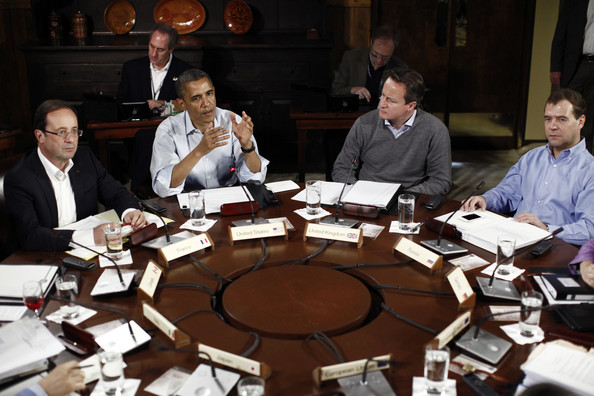
Putin Begins to Notice that Putinism Has Stopped Working
Publication: Eurasia Daily Monitor Volume: 9 Issue: 96
By:

Hardly more than a handful of experts in Moscow paid attention to the G8 summit in Camp-David last week-end, and President Vladimir Putin’s absence accentuated the impression that Russia does not really belong to this exclusive club. The seven leaders had to work hard to find answers to the escalating economic challenges; it is clear that Moscow has nothing to contribute to this joint effort though Russia has been affected by the economic crisis no less profoundly than France or Italy (Kommersant, May 19). Ironically, the only good news around the G8 table, where Prime Minister Dmitri Medvedev sat in as an irrelevant observer, was the downward slide of oil prices, which for Russia is a grave danger (Nezavisimaya Gazeta, May 17). The Moscow Stock Exchange went from a steep decline to free-fall last week reaching a year-low but hardly finding a bottom (Gazeta.ru, May 18). The main driver behind this trend is capital flight, which reached $43 billion between January and May 2012 compared with $80.5 billion for all of 2011. This situation constitutes the clearest possible signal to Putin that his model of “manual management” of the economy has lost credibility with investors (Newsru.com, May 18).
Bad news reaches the Kremlin daily, and perhaps the most problematic has collectively involved several well-respected technocrats – from Minister for Economic Development Elvira Nabiullina to billionaire and presidential contender Mikhail Prokhorov – who refused to accept portfolios in Medvedev’s Cabinet (Vedomosti, May 18). That has complicated the reconfiguration of the ruling “tandem” because Medvedev wants to get rid of such “heavy-weights” as Igor Sechin, while Putin mistrusts “modernizers” like Yaroslav Kuzminov, the dean of the Higher School of Economics, and self-serving intriguers like Vladisalv Surkov. This bureaucratic disarray reflects not only disdain for Medvedev but also the political elite’s growing disappointment with Putin. In this respect, the elite’s attitude does not stray far from public opinion, which has re-evaluated Putin’s leadership qualities – only 7 percent characterize the new President as honest, and 12 percent view him as able to engage in constructive dialogue (Kommersant, May 17). Putin tries to compensate by boosting his popularity with the working class and has even appointed a manager from Uralvagonzavod as his envoy to the Ural district, but that cadre decision has invited ridicule rather than respect (Expert.ru, May 18).
Clearly lacking new ideas, Putin tries to fall back on old sources of strength and promotes re-industrialization driven by extra-large state corporations. The aircraft industry is supposed to be the locomotive for this revitalization. The Sukhoi Superjet 100 regional aircraft was considered the pivotal project and was supposed to capture export markets by storm as early as 2008. Instead it was delayed and captured negative attention due to the Sukhoi Superjet catastrophe in Indonesia two days after Putin’s inauguration (Moskovsky Komsomolets, May 14). Russian authorities keep pretending that nothing is wrong with the plane; some $7 billion have been invested in the project, so admitting technical faults is out of the question (Gazeta.ru, May 18). This denial of the Russian industrial base’s obvious degradation, which causes a stream of accidents – from the loss of satellites to the fire on the nuclear submarine Yekaterinburg loaded with torpedoes and missiles – reinforces the dead-end into which Putin’s course has arrived.
If industrial policy amounts to distributing huge investments and subsidies, the energy policy is supposed to generate the revenues to make this largess possible. This elementary scheme barely works because the oil and gas companies, many of which are managed by particular Kremlin loyalists, need more money for themselves, partly for heavy investment projects and partly for the absolutely essential self-enrichment (Moskovskie Novosti, May 15). Rosneft tries to increase its political value by signing a series of deals with major Western corporations, including Exxon Mobil, ENI and Statoil, whereas Russia’s flagship energy company, Gazprom, is in dire straits in its vital European market where demand is shrinking while consumers turn to spot-price contracts (RBC Daily, May 18). Gazprom denies any setbacks, and its top managers enjoy the role of patrons for football and ice hockey clubs. But even the experts from state-owned Sberbank issue warnings about mounting risks to the gas giant (Finmarket, May 18).
The unquantifiable but fast-spreading perception of Putinism’s exhaustion and decay is one of the major forces propelling the opposition activities in Moscow. The next rally, planned for June 12, is again certain to gather tens of thousands of protesters, but in the meantime Moscow is bustling with daily “walks” and moving “occupy” camps that create an atmosphere of an anti-Putin carnival, which the police is unable to suppress. Disobedience and performance shape the form of the protests rather than angry resistance. These soft methods might appear ineffectual and going nowhere, but in fact they secure broadening support from Muscovites and make the riot police look stupid. Mayor Sergey Sobyanin, installed by Medvedev in October 2010, is helpless to take charge of the fluid situation because he has no support base to mobilize (Vedomosti, May 18). The spectacular growth of civil society self-organization also prepares the ground for new political parties, like the Democratic Choice or the Republican Party. It allows these new political contenders to gain profile and to progress from the margins of the political field. Their relevance is proven in various local elections and micro-conflicts centered on abuses of power (Ogonyok, May 14).
Putin faces a challenge that appears ephemeral and virtual but is insuppressible by the “hard power” in which he firmly believes. This challenge is also immune to corruption, which constitutes the lifeblood of his bureaucratic pseudo-democracy. When Putin’s henchmen unleash the riot police against cheerful “white ribbon” protesters, it generates a burst of indignation, and when he chooses to ignore the street “nonsense” it becomes an “everybody-is-invited” party that leaves him the target of jokes. He has no good choices in the struggle for regime preservation, which was supposed to be over with the perfectly managed elections, but has become instead the quintessential substance of state policy. His loyalists do not want to hear about modernization, and the entrepreneurs with ideas and energy to implement them are fed up with his leadership. The territory of freedom in Russia is expanding, but Putin cannot in earnest understand the meaning of this word.




